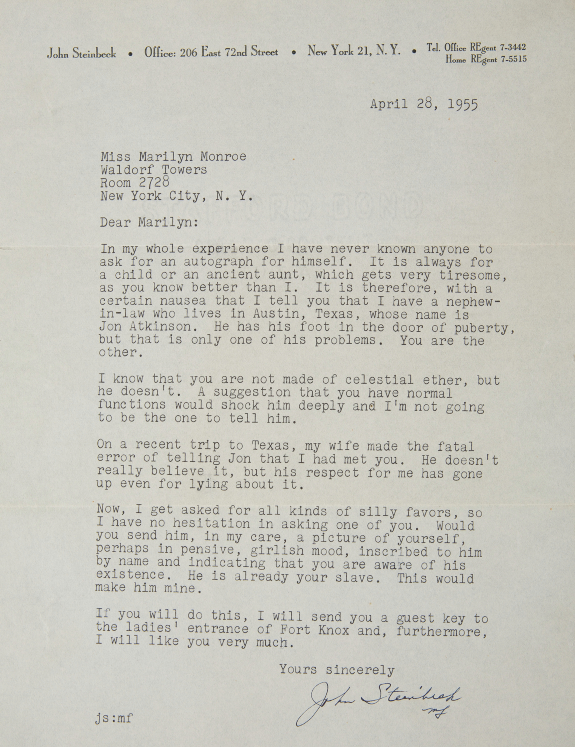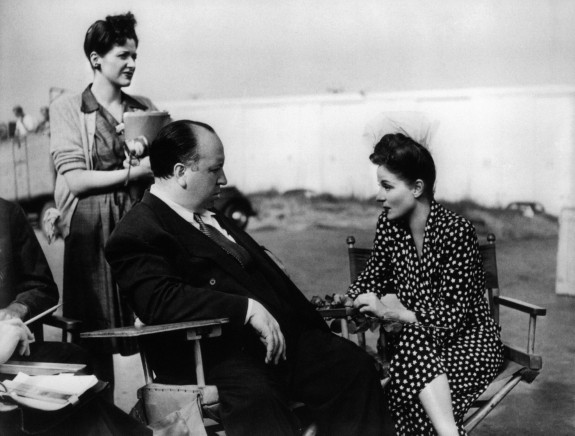A John Steinbeck letter to Marilyn Monroe (sold for $3,520 at Julien’s Auctions in 2016) has been widely circulating the internet since 2019. In this great letter Steinbeck asked Marilyn for a signed photograph, not for himself but for his then 17-year-old nephew-in-law Jon Atkinson. For those who haven't read it yet, here is the famous letter:
 |
| Source: Julien's Auctions |
It wasn't until this year that someone actually tracked down Jon Atkinson to see whether he had received Marilyn's photograph, as requested for him by Steinbeck. Michael Alberty was the investigative journalist and wrote about his findings in The Oregonian on 21 June:
I’m happy to report that Atkinson is alive and well, living in Tuscaloosa, Alabama, with Joan, his wife of 57 years. He’s a retired minister, and this commotion about his teenage preoccupation with Marilyn Monroe comes as a bit of a surprise.Atkinson vaguely remembers hearing about his famous in-law’s letter, but he’s not sure when. Amazingly, my phone call was the first time a newspaper or magazine has reached out to ask him if he received the Monroe photograph.Joan Atkinson says she first found out about the Steinbeck letter a few weeks ago. That’s when a former student from her days teaching in the library school at the University of Alabama called to ask, “Have you seen this letter?”As you may have guessed by now, Atkinson never received a photograph or anything else from Marilyn Monroe.After the call from the former student, Jon Atkinson asked his wife if she thought the letter was a fake.“It was a good question because it’s definitely not his signature. It even has the typist’s little initials, ‘mf’ underneath the signature,” Joan Atkinson said. This is where the mystery deepens.Joan Atkinson points out that Steinbeck almost exclusively wrote his letters in longhand with a pencil. “I could not imagine that John Steinbeck would have had a typist or secretary from the office sign a letter like that for him. As personal as this subject was, it seems strange,” she said.Did Steinbeck write the letter for an assistant to type? All we can say with any degree of confidence is the letter was in Marilyn Monroe’s possession. Unless the typist “mf” can be located, this piece of the mystery may never be solved.We do know young Jon Atkinson never received a photograph inscribed with a personal message from Marilyn Monroe. “That sure would have been nice, right?” Atkinson said.
[source]
Whether the letter was indeed written by Steinbeck or if it came from someone else we may never know for sure. As Alberty mentioned, the only thing we can be certain of is that the letter was owned by Marilyn, having been auctioned as part of The Estate of Lee Strasberg in 2016 (Strasberg being Marilyn's acting coach and mentor to whom she left most of her possessions). While I'd like to believe the letter was Steinbeck's, it seems odd indeed why the author had a secretary sign it for him, considering its contents and Marilyn being the addressee. (To compare signatures, check out Steinbeck's signature here.) But then again, Steinbeck had written thousands of letters in his lifetime and perhaps his letter to Marilyn just wasn't a priority, seeing that he didn't know her well. At any rate, I tried to find answers online —looking for the mysterious secretary "mf"— but, not surprisingly, I found nothing.
Incidentally, I don't know if Marilyn was a Steinbeck fan but three of his books could be found in her personal library, i.e. The Short Reign of Pippin IV, Once There Was a War, and Tortilla Flat (source).














